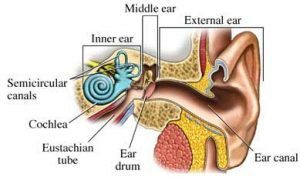

Otosclerosis may cause mild to profound hearing loss and is very variable amongst those affected. Most patients with otosclerosis have a combination of these problems, or a mixed hearing loss. If remodeling occurs in the bone adjacent to the inner ear, sensorineural hearing loss may occur. This causes a conductive or mechanical hearing loss. The abnormal bone fixates the stapes in the oval window and interferes with its ability to vibrate and conduct sound into the inner ear. Otosclerosis usually affects the last bone in the ossicular chain, the stapes, which rests in the entrance to the inner ear (the oval window). Otosclerosis can cause different types of hearing loss, depending on which structure within the ear is affected. It may occur in one or both ears and is frequently asymmetric. Otosclerosis causes remodeling of the otic capsule. Bony changes, called remodeling, happen continuously in human skeleton but normally should not occur in the bone that houses the inner ear, called the otic capsule. When you suffer from chronic sinusitis, allergies, and other sinus health issues, a more comprehensive, personalized treatment plan may be necessary to achieve relief.Ĭall today to schedule a consultation.Otosclerosis is a hereditary condition that causes the abnormal changes of the bone of the middle ear and inner ear. If you are reading this blog, perhaps your ear issues may likely be more complex. It’s always advisable to get checked out and share your concerns with a physician, especially when it’s accompanied by other, more severe, prolonged symptoms. Of course, that’s not always the case, and sometimes it can be indicative of a more serious condition. Sinus congestion and stuffiness can also affect the pressure in your ears-and treating the congestion may help. Here, again, are some of the most typical causes:Įar fullness probably most commonly results from congestion due to the common cold and usually resolves with self-treatment. However, to find the best remedy and relief from ear fullness, first, you have to identify the cause.

The good news is that it’s possible to alleviate your symptoms. How do you get rid of the pressure in your ear? Okay, the answer is: it depends. Tissue inflammation and mucus secretions can largely be a part of the reason for Eustachian tube dysfunction.Īdditionally, if your Eustachian tube is blocked and not functioning properly, fluid can build up and may cause the middle ear to become infected-leading to pain, swelling and other symptoms.Īllergies, sinus infections, the common cold or the flu, can all cause the opening of your Eustachian tube to become partially blocked. It also commonly leads to feeling pressure, discomfort, and fullness in your ear. When the Eustachian tube gets plugged up, you may not hear clearly and sounds may become muffled. When functioning normally, this prevents air pressure and fluid from building up inside your ear canal, behind your ear drum.

It plays an important role in equalizing pressure in your ear, by opening when you sneeze, swallow, or yawn. The Eustachian tube is the tiny passageway that connects your ear to your throat and allows the drainage of fluid from your middle ear. The why: how ear pressure works-let’s talk Eustachian tube Other symptoms that may accompany ear fullness can include pain or tenderness around or in the ear, itching, drainage, and even swelling, redness, and warmth. You may feel pressure, or experience muffled or impaired hearing.

In general, ear fullness is the feeling your ears are clogged or congested-and doesn’t go away through usual methods of eliminating this sensation (i.e. People can experience ear fullness for a variety of different reasons. What exactly is ‘ear fullness’ and the typical signs? In fact, ear congestion is one example of the many miserable symptoms you may encounter when dealing with conditions impacting your sinuses, nose, or throat. Because of this, a problem in one area often leads to another. Your sinuses, ears, nose, and throat are closely connected. What causes ear fullness? Is it serious? How can you relieve uncomfortable symptoms? And how does all of this relate to your sinuses? Keep reading to learn more about ear fullness, its causes, and how it can be interrelated to your sinus health: First things first-it’s all connected It may also sound suspiciously similar to sinus and nasal allergy issues. These can be common signs of ear fullness. When you experience ear issues, it’s also important to pay attention. Common advice says it’s wise to listen to your body.


 0 kommentar(er)
0 kommentar(er)
